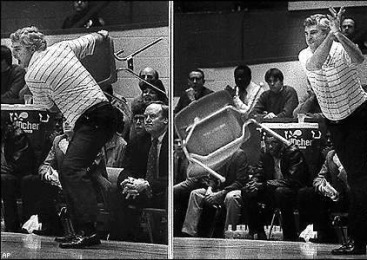Philosophy
Two of the biggest and most evident elements of Bob Knights coaching philosophy were hard work and discipline. Both of which were most likely derived from Knight enlisting in the army and coaching for the academy. While coaching at the West Point Academy, Knight was assistant under Tates Locke; in 1965, three years later, Knight was promoted up to head coach and at that time, became the youngest Division I head coach in the nation. Knight being young and in the army were a huge part of how his thought process worked and how he coached, he coached like a “general”. Two other compliments of the army that influenced his coaching style were control and confidence. Control being a very evident aspect of his philosophy, it wasn’t uncommon to see Knight throwing chairs or other items or even assaulting players or referees when things didn’t go the way that he planned. When Knight was right, he was right (in his eyes); nobody was going to change his mind, and he was not about to hide anything or admit that he was wrong, that was against his books. As was once stated the general thrives on an “out-of-control dictatorship.”

Bob Knight 2
As stated earlier, Knight likes control. In the game of basketball, particularly Division I basketball, there are things that can limit how much control the coach has over his players, such as the shot clock, which only allows the team to have possession of the ball for a limited amount of time without shooting the ball. Coaches, like Knight, that are confident in their personal abilities to get a team to victory dislike rules that inhibit their talent. So, Knight did not like the shot clock nor did he like the three point line either. Knight used the perimeter more as a guide for his players to run plays on the outside to then get a either an uncontested layup or jump shot inside. He had stated at one time that he did not like these aspects of the game because they are “talent oriented rules” and do not award intelligent play. Knight believed that players should be rewarded for intelligent play rather than just being rewarded for being extremely talented and shooting three pointers all night. Knight’s coaching philosophy and his ways of coaching taught his players to be disciplined, unselfish, and to use each other on the court as benefits to one another. His philosophy had good meaning to it but the way he acted on it was probably inappropriate. While being controlling and out of control he became a very successful coach.
